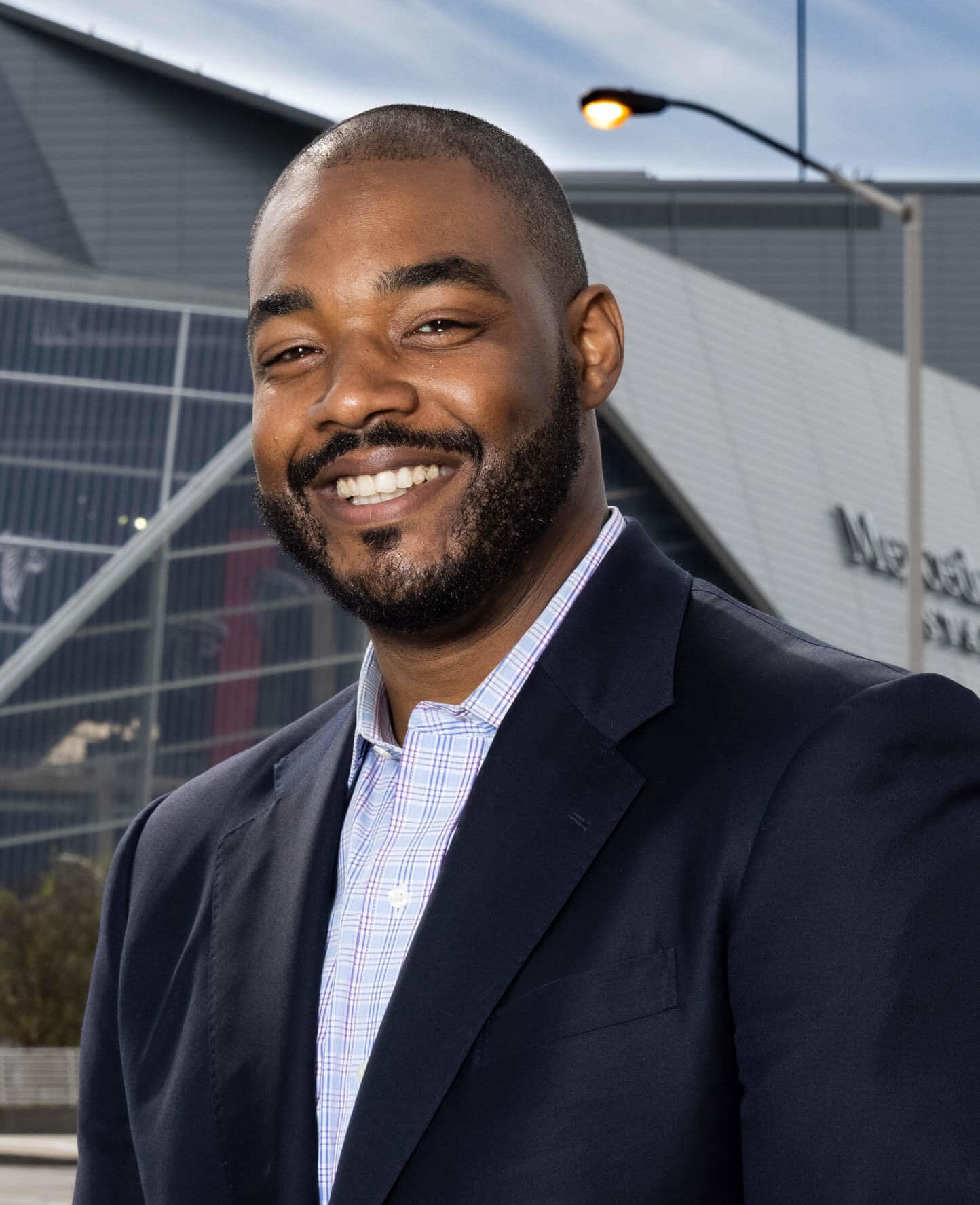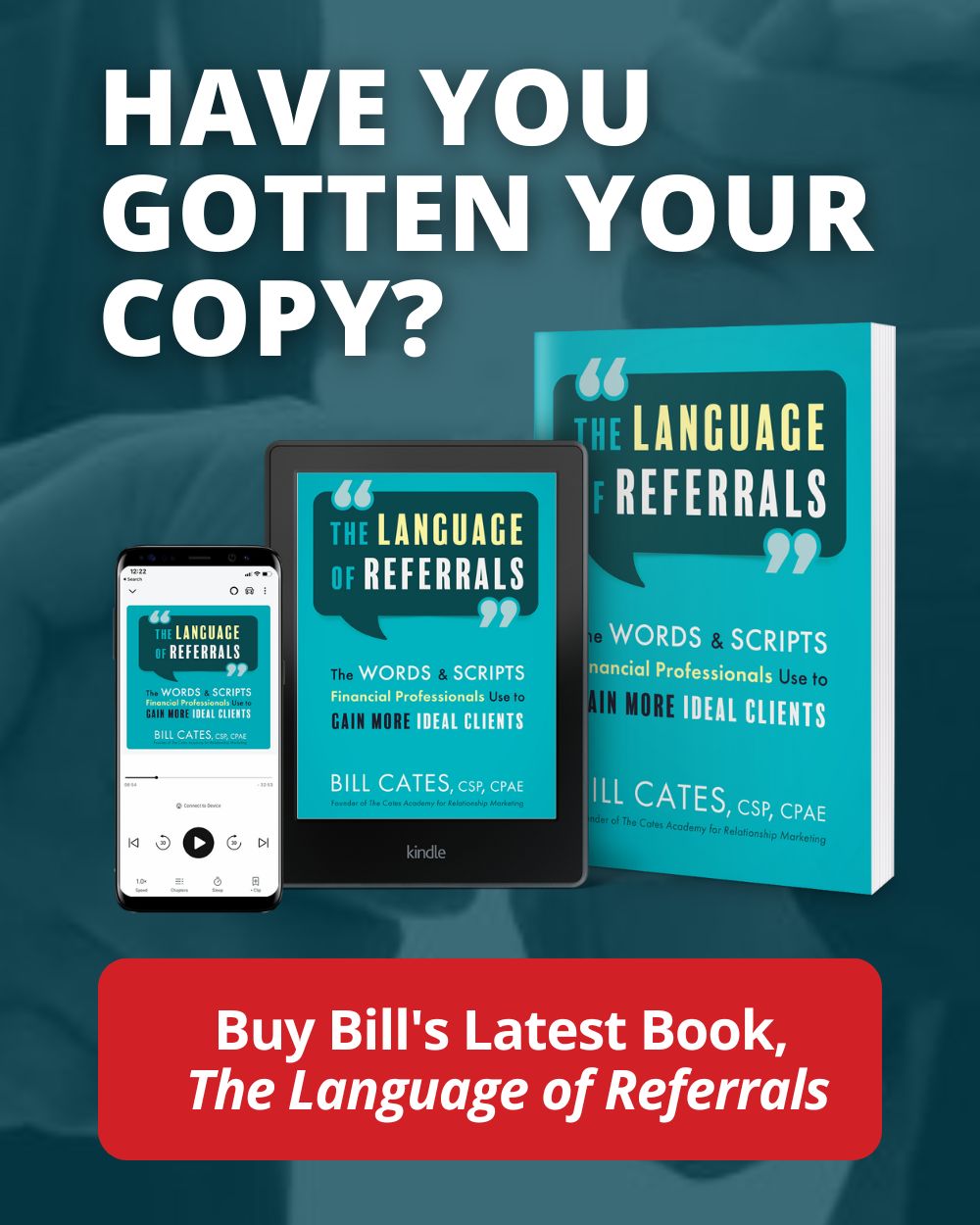Check Out Bill Cates’ NEW Top Advisor Podcast™
Interviews with Top Advisors for Top Advisors!
Top Advisor Podcast™
Ep. #19 – What’s the Skinny on Becoming a Financial Advisor for Athletes? with Walter Stith
When most people think of financial advisors who work with professional athletes, they probably imagine a glamorous lifestyle of spending time with their favorite players, getting a behind-the-scenes look into professional sports, and free tickets to games.
But what is it really like being a financial advisor for athletes?
In this episode, Referral Coach Bill Cates sits down with Walter Stith, former NFL offensive lineman turned financial advisor for Morgan Stanley, ranked by Forbes as one of America’s Next-Gen Advisors. Walter discusses the lessons he learned while playing professional football, and the importance of protecting your finances from blindside hits.
Want More Top Advisor Podcast Episodes? CLICK HERE!
–
Walter discusses:
- Pros & cons of working with professional athletes
- Why it’s important for athletes to think about life after professional sports
- The importance of having a good advisor or agent that specializes in working with pro athletes
- What name, image, and likeness (NIL) deals look like in college sports
–
Connect With Bill Cates:
-
Show Transcript
Welcome to the Top Advisor Podcast brought to you by ProudMouth’s PodRocket Academy. I’m your host, Bill Cates, creator of the Cates Academy for Relationship Marketing. In each episode, I interview one of our industry’s top performers, getting them to pass on their secrets to success to you. So that you can impact more lives and generate more income. Now onto the show.
BILL: Welcome. You know, before we get started, I want to let you know about a guide I’ve created that brings together some of my latest thinking in the area of referrals, introductions, and communicating your value. While the guide is free, I still think you’ll find it quite valuable. Go to ExponentialGrowthGuide.com.
Whenever I speak to a financial advisor who works with professional athletes, I think, you know, that that must be cool. And being around professional sports, maybe getting tickets to a game, great seats. Sometimes getting them behind the scenes, look at professional sports.
Of course, we know. Two sides to the story, right. But what might seem cool on the outside looking in? Yeah, maybe not quite the reality. So when I was introduced to today’s guest, I knew he was already successful and a rising star in this business. But when I saw that he played professional football, that added a new dimension to what I thought might be a fun interview.
Walter Stith played his college football at Western Michigan University. He must have been pretty good because he went on to play with the Buffalo Bills. And then with the BC Lions in Canada. Walter was an offensive tackle who protected the quarterback’s blind side, just like the movie Blind Side.
Now as a financial advisor based in Atlanta. Ranked by Forbes as one of America’s next-gen advisors. Walter helps his clients protect their financial blind side. So Walter Stith, welcome to Top Advisor Podcast.
WALTER: Thanks so much for having me today. Glad to be here.
BILL: Yeah. Great to have you, man. I’ve been looking forward to this for a long time.
So I want to discuss two main things, at least. First, for any advisor who is seeking to work with professional athletes, you know what they should know about the target market, the pros, and the cons. I’d also like to hear a little bit about how you work with your clients, and how you protect them from their financial blind side. Tell us a little bit about how your path went from wearing sweats to wearing suits.
WALTER: So I played in the NFL. I started with the Cleveland Browns. I was an undrafted priority, a free agent coming out of college. That means I did not get drafted and I did not get a signing bonus.
But I was in the NFL. So I started with the Browns, and then played for the Buffalo Bills for two years. And after my rookie season with the Buffalo Bills, I took an internship with City Group Smith, Barney in New York. The NFL has several different programs for players to participate in, one of them being the internship program.
And because I majored in finance in school, I knew that I wanted to work on Wall Street in some capacity, but I didn’t know what I wanted to do. So I took an internship and went to City Group Smith Barney in New York City in Times Square. And that was such a change in my day-to-day life and lifestyle. But it was a really wonderful experience. Being a professional athlete, you know, as an athlete, my day would start at 6:00 AM, wake up, and go to the facility. Get a workout in and then I’d have a team meeting and then a group meeting with the offense and the positional meetings. And then we may have some sort of walkthrough and then we’d have practice and then there’d be more meetings.
Maybe a visit to the training room, any bumps or bruises taken care of. I’d get dinner, watch some more films, come back the next day and do the same thing. And so transitioning from that lifestyle to waking up again in New York City. I have an aunt that lives in the Bronx right near Yankee stadium. So I was fortunate enough to be able to spend a lot of time there. But again, it was similar. Wake up at 5:00 AM. Jump on the subway at 6:00 AM, and head down to Manhattan. You know, I grab myself coffee and bagel on 52nd street. Go up to my office, read the Wall Street Journal, and the New York Times, log into my Bloomberg system, and meet with my advisors that I was working with at the time, who was interning under. Two of which I’ll mention. One, her name is Carol Glacier, at the time she was Forbes Top 100 women wealth advisors, and the other was Rob Schmidt. He was a younger advisor. And the manager in that branch put me with those two advisors so that I could see the two perspectives of one, a successful well-established advisor, a mature book of business.
And then that of someone who was new in the business and who was growing, right. Who’s going out, you know, hitting the pavement. Dialing for dollars, cold calling, sending emails, just multiple marketing campaigns to bring in new business so that I understood that you don’t just come into this business and get on the Forbes list.
And actually, in working with Carol Glacier, I set the long-term goal then, although I knew I was still playing football, that one day I would be awarded as Forbes, Top Wealth Advisors. And I’ve done that in the past three years with the Forbes next-gen ranking. So, it was a great accomplishment for me to see that come to fruition and to know that it was something that I thought about like long ago when I was just an intern in the NFL internship program.
BILL: So let’s fast forward a little while. You finish up your pro career; you become a financial advisor. Somewhere in there, you make a decision to work with professional athletes. It kind of makes sense. That’s your “natural market” as they call it. Talk to me about the benefits, what’s great about working with pro athletes? Obviously, the money can be pretty good.
We know that a lot of them are not getting good advice. We all know that some of them, lose the money that they’ve earned, their signing bonuses, etc quickly if they aren’t getting the good advice. Tell us about that. What is the fun, the benefits, and then we can shift from that and we can talk about any of the downsides or the cons if you will, about working with professional athletes?
WALTER: So, working with professional athletes, I know what they’re going through because I’ve been through it before. I have experience from being a player. But as well as being an advisor to players that have gone through this process knowing that they need to think about the end at the beginning. And many times you look at the average age of players going into the NFL. They’re anywhere from, you know, 20 to 23 years old. And a lot of times, Bill, this is their very first job. So think about it, if you’re growing up. Right. Did you have a job in high school?
BILL: Oh, yeah. My first job was pumping gas at a gas station and many other jobs since then.
WALTER: Right. So, you probably pumped gas at a gas station in the summertime, when you’re out of school. And so for blue-chip athletes, their summers are spent going to different camps and playing in seven on seven leagues or playing AAU or working out with a trainer.
And so they just haven’t had the time to commit to having a real job outside of sports, because sports is presented to them as their job. Like this is your job. This is what you’re going to do that’s going to help you to earn a scholarship, go to school, and have the potential to go pro. So let’s just say, for instance, I don’t know what the percentage is, but many of them go through high school never having a job.
They get recruited by all the top colleges in the country. So schools are presenting the best that they have to offer to these athletes to get them to come to school. They go to school, they receive a scholarship. Schools pay for it, they don’t have to worry about taking out loans or going into any debt.
And now student-athletes can get paid off of their own name, image, and likeness. And so before name, image, likeness, guys would go to school and then they’re either their junior or their senior year. If they have had a career good enough to establish themselves as an NFL prospect and if several different lists and services out there and scouts that, put out lists on who the top players are and who to look up, who to look out for the upcoming draft.
Now, keep in mind. These are guys who have never been employees. They’ve never filled out a resume. They’ve never gone on a job interview. They’ve never paid anything into social security. But then they have been put in a position where they have agents, financial advisors, marketing managers, and public relations managers, all reaching out to them so that they can hire them. So in that sense, they are employers before they’re our employees.
BILL: Hmm. Interesting.
WALTER: Right. They go right into a field where they’re getting their first job, but their actual first job is to be a CEO of themselves where they’re hiring an agent. And an agent’s job is to really help them throughout this process.
To educate them on what’s coming next because many times they don’t know. They know, “Hey, there’s a draft”, but what happens between my last college football game and hearing my name called at the NFL. There are many different things that happened between the last season and actually getting on an NFL team.
And so having an agent or having an advisor, someone who has experience in working with that can help them with that process to help them prepare.
Imagine Bill, if your first job the minimum was $720,000.
BILL: That’d be nice. Huh? It would be daunting, confusing perhaps, even though.
WALTER: Right. It can be daunting. And so the fact that we think that it’s daunting for professional athletes in their mind, this is the norm. Because they haven’t had another job. So their first job is making well over six figures at a minimum, as a rookie. And that’s their very first job. So the challenge there is not understanding the ramifications or not even understanding how much money it is.
Or how much money isn’t Bill, depending upon their own personal situations. All right, you make 720,000 your rookie season. Let’s say you’re 20 years old. The average career in the NFL is three and a half years. So let’s say you make that for three years, make a million and you know, a million and a half million eight.
Maybe you take home 900, a million, a million 2, but you’re still young. And you have to transition into something else because if you’re done with the NFL at, let’s say age 25, you still have a long life to live. And so the challenge is getting young athletes to understand that you can’t live the lifestyle of the average person that makes $720,000, who is well established in their career. Maybe they’re in their forties or fifties. And they’ve had time to build up to that. When you get that right out of the gate and that’s your first job, you really don’t appreciate it as much or know that you need to appreciate it to save for life after football.
Because there’s going to be a transition, no matter how long you play, even if a guy plays for 10 years and they’re done, what I’m trying to get them to understand is how do you take the things that you value these are the things that are important to you right now. Let’s define why they are important to you. And we’ll use the example of family, so if it’s a young guy at the time, any of these guys aren’t married, right.
But they may have a girlfriend and then eventually they’ll end up getting married and have kids. And so now they have a family. Your family is important to you as a man, you have to take care of your family by providing the basics of life, food, clothing, and shelter.
And so food, clothing, and shelter, they all cost. And if you don’t have money to provide for your family, something that you value, you have to get them to understand that at some point, football is going to end and your cash flow is going to stop. So the money that you make and the checks that you get on a constant basis are going to stop, and then you have to transition to something else that’s going to then create cash flow and income for you to continue to provide for your family.
And sometimes it can be challenging because they are just so young that they can only can see the things that they want now. They’re like, I want a nice car. I want a nice house. I want all the things that I’ve never had before. I want to shop at high-end retail. I want to eat at the finest restaurants.
And how did they get introduced to these things through the recruiting process, right? You go sit down with agents and they’re taking you to the steak houses and they bring your family. And before you pick an agent, you’re probably meeting with several agents, and several financial advisors.
So you just get wined and dined, and then it creates the habit of going out to high-end restaurants all the time. And many times when you’re young when your meals are all being prepared for you in college. Right? Because we had a meal plan, we weren’t really cooking much. So just to get to the point of like being able to cook food at home, and not eating out for every meal, and technology doesn’t help with this because literally you can just Uber eats or grub hub or any of the food delivery apps to get it delivered right to you.
And Bill, as you know, that’s expensive, it costs money, right? It costs a lot. That’s a really expensive lifestyle to have every meal prepared for you.
BILL: Is that the biggest challenge that you’re facing then, is it just these habits and expectations they’ve developed? And kind of trying to break them a little bit of that habit? Or is it the other people in their lives or maybe a combination of that, that be it, people, they grew up with or be it, other people, they’ve met along the way with the business deals and all the temptations? People saying, invest your money here.
For you as the advisor, not so much for them, what’s the biggest challenge in working with these folks?
WALTER: I would say sticking within the budget. Right. If we say we’re going to spend X amount of dollars or less per month. Then do that. Because if you put together a financial plan and the base of what my team does in working with our clients is financial planning. We want you to, #1 know how much you have. Know how much you make. I want you to be able to save, save as much as you can, and also be able to invest that for your future.
One of the biggest challenges is controlling their lifestyle. There are many stories out there. We’ve seen the 30 for 30 documentaries. There are several examples of professional athletes and entertainers who have wasted their money. Whether it’s family and friends, whether it’s bad investments, whether its you know, just exorbitant lifestyles. And then sometimes it’s the mental health aspect that comes in. A lot of people were talking about mental health now. And when you look at the demographic, every demographic of the NFL, right. It’s I would say 75% African-American. And if you’re looking at just that portion of the NFL, and you’re thinking about the backgrounds that they come from and thinking about economic inequality and thinking about the challenges that their parents are facing, their grandparents have faced, and thinking about the wealth gap that is.
And so many times a lot of athletes, especially those that come from situations where they have been affected by the wealth gap, the racial wealth gap, guys can’t really establish their future because they’re going back with the money that they have to fill the gap for their parents for their grandparents.
BILL: Yeah. Real quick, Walter, I wanted to ask you about the name, image, likeness, and the new deals that are happening on the college level. Have you gotten involved in those at all? Have you been working with any college-level athletes to help them with their finances, some of these folks, these guys, and some gals are getting a lot of money from the N I L most aren’t yet. Have you done any work in that area yet?
WALTER: I have. Yeah, I’m actually working with an athlete that is making money through name, image, and likeness and their challenges there. So you take the same graphic of athletes and you just, now they’re 17 years old now they’re 17 and 18. All right. And they’re making all those same decisions where one with NIL many times, they’re either getting.
Paid through an endorsement or they’re getting a brand deal where they’re creating their products, right? Where they’re using their name to create a brand, attach it to a product and sell to their followers and fans.
BILL: I mean, now the jerseys with their name on them they can be compensated for that right? Before it was just, “Hey, I got a Jersey with the starting point guard” or the quarterback or whatever name on it.
But now that person can be compensated for that. Correct?
WALTER: That is correct. Yeah.
BILL: Which is quite a change.
WALTER: Yeah. And then you still have all those same challenges of all right. So how do I get paid? You know, do I set up some sort of business entity, and what type of entity do I set up? Do I set up a limited liability corporation? Do I set up an S Corp, C Corp, or a partnership? Do I need to hire a marketing manager, or a financial advisor? You know, what do I do with taxes? How much money can I make without it affecting my financial aid that I may be receiving? So many different questions.
There are pros and cons with a name, image, and likeness. You know, the good thing about it is, hey, now student-athletes can capitalize without being penalized by their universities in the NCAA. So that’s a good thing. It’s great. Because a school could have a five-star athlete, you know, a top potential NFL player and they could put a t-shirt in the bookstore and the bookstore will sell that shirt and make money on this, on this player’s name, image, and likeness and they receive none of that.
All right. Given they’re on scholarship and their education is paid for. It pales in comparison to the amount of revenue that some of these sports teams are generating for schools and universities.
BILL: Yeah, absolutely. You know, at the beginning of the show, I wanted to talk a little bit about how you work with some of your clients. And I know you have kind of a fun way to explain what you do, especially as soon as athletes get the message. But first, let’s take a quick30-secondd timeout for a word from our great sponsor.
[SPONSOR MESSAGE] This podcast is sponsored by ProudMouth, the influence accelerators. If you’re like our clients, you want to spend more time educating people and less time selling.
That’s why we turn main street experts like you into trusted mainstream authorities. We help you amplify your influence over a growing audience of magnetically attracted fans who will chase you down instead. Visit ProudMouth.com to learn more.
BILL: By the way, I offer listeners of Top Advisor Podcast, quite a few resources, all geared to help you multiply your best clients. Simply go to ReferralCoach.com/Resources. You’re going to find a lot of great tools there and make sure you sign up for our weekly tips. So you’ll be notified when our next podcast interview is as well as lots of other ideas we’ll send to you as we can.
So, today again, my guest is Walter Stith, former professional football player, offensive tackle to be specific. Now clearly a rising star Forbes next-gen advisor. Walter, I know that you kind of have some fun, creative ways to protect your client’s financial blind side, using some sports metaphors and other fun things. So not just for your athletes to get, probably all your clients find some fun in this. So talk about that just a little bit. What are some of the expressions words, phrases? Give us a sense of how you have some fun and help people at the same.
Yeah. So, being a former football player, in particular I was an offensive lineman and I played left tackle and there was a movie that was put out, I don’t know how long ago, but the Blind Side, Sandra Bullock, Michael Orr, we’ve all seen that story. As a financial advisor and former offensive lineman my role is to protect my client’s blind side as their left tackle.
So that’s one analogy that I use. And what does that mean? With having so many things to consider, so many things to think about and this really kind of being your first job in most cases, it’s education, right. And so what I’ll tell guys is when you show up for a team, when you go to college, the first thing you get is a playbook.
So when you get your first job, my job as your financial advisor is to give you a playbook. In the beginning of your football playbook is your schedule of events, right? It’s going to tell you what time you have to be at practice, who is running the practice, how many different sections of the team you have to go to, right?
So there’s your team meeting, your positional meeting and then there’s offense, defense or special teams. And so with your financial life, which you have to look at is, all right, you have a contract which is going to tell you how much you get paid, when you get paid, what’s guaranteed and what could cause your contract to be null and void.
So first and foremost, we’re looking at creating a playbook. So what I’ll do is I’ll get their contract from them or their agent, and I’ll say, all right, if you’re a rookie you’ll sign a four year contract. And if you are a first rounder you’ll sign, a four year contract, and then the team has the option to pick up a fifth year.
So I will pull out all of the numbers from the contract because out of all of the 29-35 pages that are there and I’ll show them on a spreadsheet exactly how much their contracts are going to make in the signing bonus. And their salary, any roster bonuses or workout bonuses that are there.
And it will also track their endorsement income money that they make outside of football with endorsement deals and things like that. From there, we’ll take a look at what their potential withholdings are, and I’m not a CPA. So I do not give tax or legal advice but as an advisor can show you that, Hey, these are, this is the tax bracket that you’re going to be in and this is what you can expect from paying taxes based upon what you’re going to make.
All right. First step. So you got federal taxes, state taxes, you got social security, you got Medicare, Medicaid, you got, and also you have your 401k contributions or your 401k deferrals. Those are the things you really have no say over. These things that you’re going to pay regardless. And sometimes that’s sticker shock. When guys come out of school and in many cases, they’re making over a million dollars sometimes, and they see that they’re going to pay over 500,000 or close to 500,000 of that in taxes and money they’re not going to receive, there’s some shock that goes here, right?
BILL: They probably already spent a million dollars in their head. Right. And yet they’re not even going to get a million dollars.
WALTER: Exactly. Right. They’re like, all right, I’ve got a million dollars. I’m going to buy a house of 500,000 and we got a hundred thousand dollar car, you know, do this for my mom and my family. And it’s like, well, wait, you didn’t even think about Uncle Sam. What about Uncle Sam? You got to take care of Uncle Sam. And they’re like, who’s Uncle Sam. I don’t have them. Uncle Sam was like, no, you have an uncle.
We all do. We all have an Uncle Sam.
So just kind of showing them that, and then putting together a budget. Right. And so when you’re putting together a budget, it’s almost like setting up a team. So when a team, if you’re looking at you, got your offense, you’ve got your defense and you can have special teams and each position on that team has a certain task that they’re supposed to take care of. So for instance, let’s take the offensive line. The role of the offensive line is the foundation of your offense. It is to protect you. It is to protect your quarterback, protect your running back, and to keep defenders from getting to the ball. That’s the goal of the offensive line.
So when you’re looking at finances, your protection is making sure that you have sufficient cash balances to take care of your day-to-day obligations. Whatever your annual budget is, you need to make sure that you have cash in the bank, cash deposits to be able to take care of your expenses.
And if you even go down a little bit further, the center is who snaps the ball to the quarterback. Right? And so when the ball comes off the ground and goes to the quarterback, that is what I would consider a direct deposit. That’s cash in the bank. Right. So, we can’t mess up. First of all, let’s not mess up the center QB exchange, right.
By making sure is there is no play.
BILL: If there’s a fumble, there there’s no play. Right?
WALTER: So if there’s a fumble, there there’s no play. And Bill let’s think about the ways that there can be a fumble. I’m going to go back to a story when I was in the NFL, one of my jobs as a rookie in the NFL was to go upstairs and give the vets checks.
And if several jobs that you get as a rookie, depending upon what team you’re on, you could be bringing in breakfast on Saturday mornings for the vets, you could be helmets and shoulder pads. I’m sure you’ve seen that on some of the combine shows and hard knocks where, you know, rookies just get tasks, right?
You got to sing songs. Like the initiation process. So my job was to go upstairs and get the vet checks on payday. So I would go up, get the checks, come down. And during my rookie year, one vet said, “Hey, I want to motivate you. Take a look at my check.” I’m like, “Oh no, that’s your check. That’s your business. I don’t want to do that.”
He was like, “Nah, go ahead. Open it up.” So I look at it. Five figures every week he gets, right. So he took that check, threw it at the top of his locker and I’m 6’8”. So I can see the top of his locker. He’s got three or four checks up there. Bill that is fumbling the play, right? Having checks sitting in your locker is a fumble on the center QB exchange.
Right? The prudent thing to do will be is to have your money directly deposited into your account so that you don’t have the risk of losing a check. Fumble on the play Bill. So that’s one example that I use.
BILL: This is great. You can give me one where we’re nearing our end here, but just give me one more. Give me one more fun metaphor. Cause we could probably play with this all day long.
WALTER: Another example is when thinking about making an investment choice and having them to understand the levels of risks. So I’m going to use a basketball analogy here. So when I’m explaining to them the different types of investments, like what is a stock? What is a bond? What is equity? What is fixed income? What is cash? What are cash alternatives?
So you think about basketball, a slam dunk, or layup. It’s something that I would consider cash or cash alternative, either a CD, a money market. There’s very low level of risk there. It’s as you say, a layup.
And so when you start thinking about, well, what is a bond? A bond may be a three to five foot jumper.
BILL: Less likely to miss but possible miss. But little less likely.
WALTER: You know, it’s a, it’s a three to five foot jumpers, high likelihood that you go to make that shot. You shot it over and over again. It’s a fundamental part of the game. That’s your fixed income. So when you think about equities and then they’re different equities. You got different indices, you got the S& P 500, you got large cap, mid cap, small cap. And so the analogy is the further you go out from the free-throw line, the more risk you’re taking.
So when you get into really risky investments, that’s more like taking a half court shot or taking a full court shot. And on the football side Bill, here’s another analogy that I use on the football side. Your running backs are going to get you good three to five yards each play. So running back is a solid large cap stock value. And you think about growth. You might want to get a little bit more, yards per play. So that could be a wide receiver or a tight end. A small cap. We’ll just call that a small cap IPO could be considered a kick returner, right?
Kick returners can do several things. They could fumble the ball. If you look at the statistics of like startup companies, right? Many of them do just fumble the ball, but some of them can fumble pick it up and score a touchdown. So those are some of the fun analogies that I use with physicians in basketball or football to kind of explain the different types of securities and planning.
And guys get it, they understand it.
BILL: I see a book here, Walter. This could be a very fun way for any anyone that loves sports, men, women doesn’t matter. Just could appreciate it.
So with us today has been Walter Stith, former professional football player. Now clearly a rising star in financial services, working with professional athletes, now working with college athletes and other wealthy individuals. I know that you’re not just working with athletes and looking to do more of that as well.
So, Walter, thank you for being on Top Advisor Podcast. Really do appreciate it.
WALTER: Bill. Thanks so much for having me. I really enjoyed spending time with you. It’s an honor, and a pleasure to be on your platform. Thanks so much for sending your books, Radical Relevance. I’m digging into that, picking up some notes there to get myself up to these owners.
BILL: Yeah, there you go. That’s the next step. So, look everybody, if you haven’t already done so head over to ReferralCoach.com/Resources to sign up for our weekly tips and kind of free guides.
This is Bill Cates, reminding you that ideas do not make you more successful. Only acting on those ideas will bring you the success that you want. Thanks for tuning in.
Thank you for listening to the Top Advisor Podcast brought to you by ProudMouth’s PodRocket Academy. I encourage you to visit my website, ReferralCoach.com for links to my books, online courses, and to register for the Cates Academy.
About Our Guest

Walter played his college football at Western Michigan University as an offensive tackle. He also went on to play in the NFL for 2 years with the Cleveland Browns and Buffalo Bills. Before finishing up his professional career in CFL with the B.C. Lions in 2009. He has spent the last decade working for Morgan Stanley as a Financial Advisor. He is currently ranked by Forbes as one of America’s next gen advisors. Walter helps his clients protect their financial blind side.
Walter lives in Atlanta with his wife Aisha, daughter Kaili, and two sons, Kingston and Chase. When he isn’t protecting his client’s financial blindside, he enjoys being active through running, biking, and hiking.
Connect With Walter Stith:
![]()
Never Miss an Episode!
Click below to subscribe on your favorite podcasting platform.
P.S. Don’t keep Top Advisor Podcast a secret … share with a friend or colleague!
Click Here to Subscribe Tell a Friend

About Your Host
Bill Cates, CSP, CPAE, works with established financial advisors to speed up their growth without increasing their marketing budget. Advisors tap into Bill’s proven process to multiply their best clients through introductions from advocates and Centers of Influence (such as CPAs and attorneys), communicate their value proposition more effectively, and create a reputation in a profitable target market. Bill helps advisors move from push prospecting to magnetic marketing – to attract more Right Fit Clients™.
Bill is the author of four best-selling books, Get More Referrals Now, Don’t Keep Me a Secret, Beyond Referrals, and Radical Relevance. Bill is a highly sought-after international speaker and coach, as well as the founder of The Cates Academy for Relationship Marketing™.
Do you know someone Bill should interview (including yourself)?
Do you have a topic you’d like to see covered?
Contact Bill Cates directly: BillCates@ReferralCoach.com







